- Home
- Sustainability Home
- Environment
Responding to Climate Change
- Sustainability Home
-
JINS’ Ideal World
-
Material Issues and Medium to Long-Term Goals
-
Messages from Executives
- Sustainability Promotion System
-
Environment
-
Society
-
Contributing to Local Communities
-
Governance
- External Evaluation and Initiatives
Policy for Responding to Climate Change
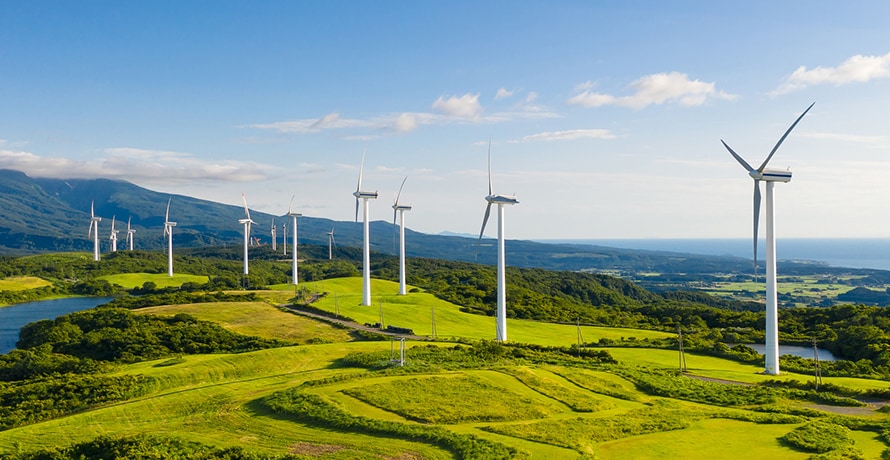
As a leading company driving the eyewear industry in Japan, JINS will promote the reduction of greenhouse gas emissions across the entire supply chain in full agreement with policies aiming to realize a carbon-free society by 2050, which have been set by the Paris Agreement and the Japanese government.
As a response to climate change, JINS will proactively work on initiatives from both perspectives of risks and business opportunities, and by doing so, contribute to solving environmental issues, as well as giving rise to new value. In addition, JINS has been directly dealing with greenhouse gas emissions (Scope 1 and 2), along with gradually taking measures against greenhouse gas emissions across the entire supply chain (Scope 3). In this way, we are working on efforts to successfully achieve the 2030 Goals.
Related Data
Information Disclosure Based on the TCFD
Carbon Neutrality Roadmap
To virtually achieve carbon neutrality by 2050, JINS has established a goal of reducing greenhouse gas emissions by 30% (Scope 1 and 2/compared to 2020) by 2030. We have also been calculating and publishing our Scope 3 emissions since 2021. Moreover, in support of the Paris Agreement’s long-term goal of “holding the increase in the global average temperature to well below 2°C above pre-industrial levels and pursuing efforts to limit the temperature increase to 1.5°C above pre-industrial levels,” we have established a roadmap for reducing emissions by 2030, with goals for reducing Scope 1 + 2 emissions by 42% (compared to 2020)* and reducing Scope 3 emissions by 25% (compared to 2022). We will continue to enhance our sustainability measures with the goal of becoming carbon neutral with virtually zero emissions by 2050. Please refer to the Sustainability Data Book for Scope 1, 2, and 3 emissions.
*Scope 1 + 2 emissions reduction goals for 2023 were revised upward from -30%

Reducing CO2 Emissions by Introducing Renewable Energy at Stores
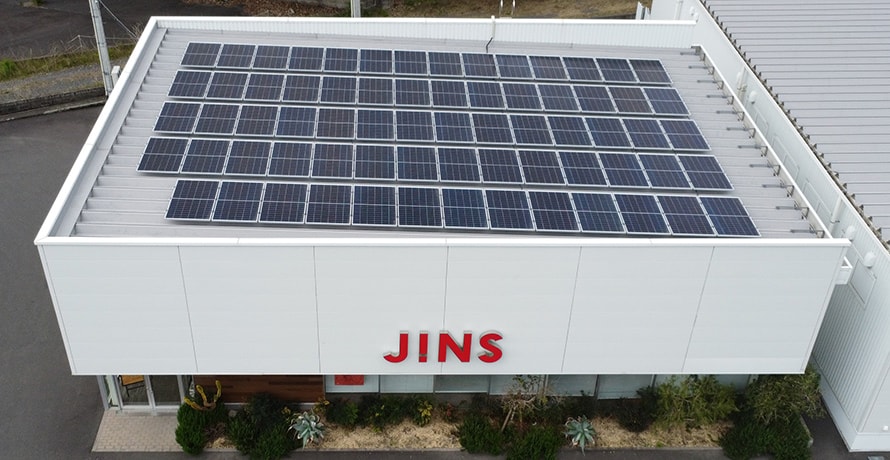
JINS is promoting the spread of renewable energy by installing solar power generation equipment, either owned by the company or through PPAs, in its stores. In addition to solar power generation, we are also considering switching to a renewable energy power plan with a non-fossil certificate. In future, we will further promote the introduction and switchover to renewable energy sources, including the purchase of non-fossil certificates. Please refer to the Sustainability Data Book for the latest status of renewable energy introduction.
Establishing Environmentally Friendly Stores
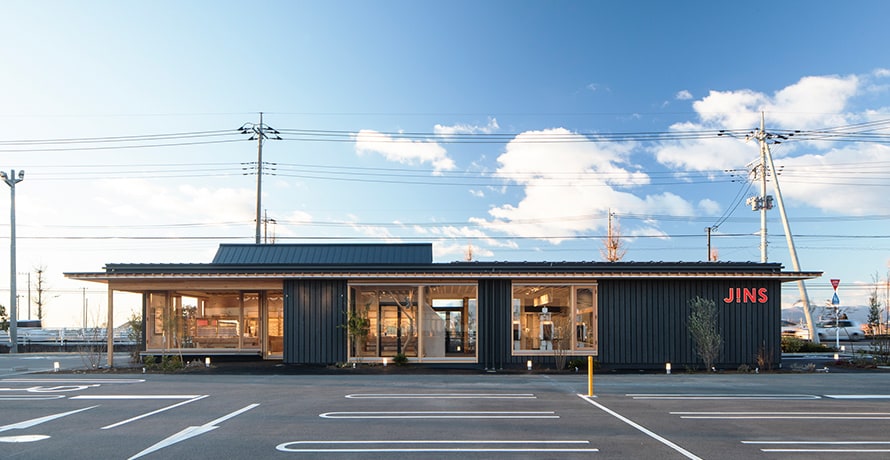
JINS is working to reduce greenhouse gas emissions with the development of environmentally friendly stores. JINS Maebashi Kojimata, which opened in January 2022, is highly regarded as a store that embodies JINS’ efforts to promote sustainability; that is, creating an environmentally friendly store that builds new relationships with the local community. The store is the first among JINS stores to have solar panels installed on its roof. We expect that the store will be able to supply approximately 70% of the electricity it uses through solar power generation.
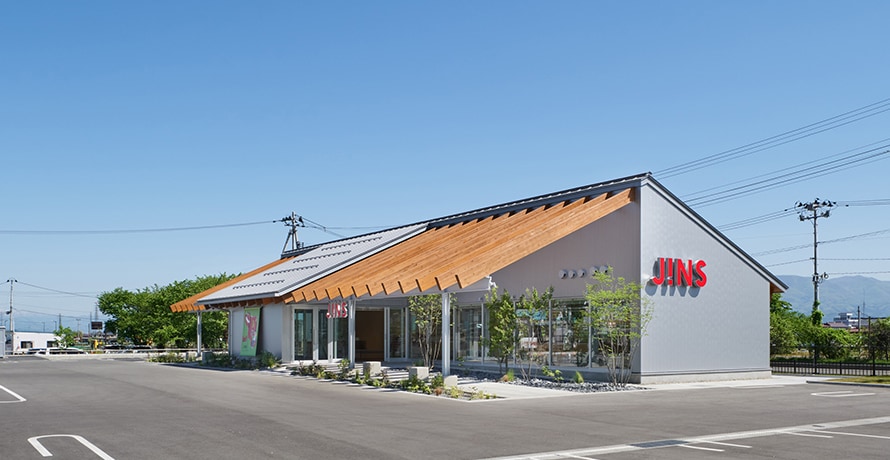
Meanwhile, JINS Aizuwakamatsu is an environmentally friendly roadside store that successfully coexists with the local community. It opened in April 2022 in the city of Aizuwakamatsu, Fukushima Prefecture, where the Smart City concept and other unique urban development projects are underway. The store’s exterior walls and other fixtures are made of highly insulating materials, while its windows are double-glazed with a special coating. In addition, highly efficient air conditioning and ventilation systems have been introduced and solar panels have been installed on the roof for energy conservation. Through BELS, a third-party certification system that evaluates the energy-saving performance of buildings, the store was recognized as reducing energy consumption across the building by 39%, making it the first* street store in the eyewear industry to receive a five-star rating, the highest rating possible.
*Based on research by JINS
Reducing CO2 Emissions Through the Use of LED Lighting in Stores
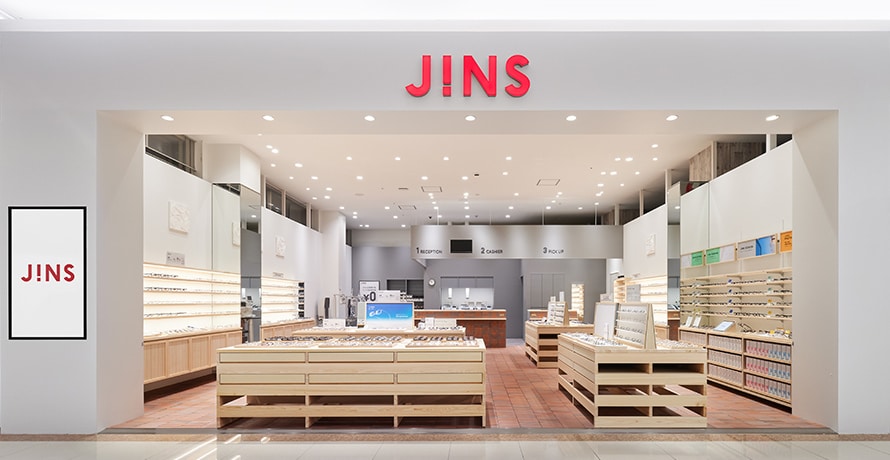
With the aim of developing environmentally friendly stores and reducing the amount of CO2 emissions, JINS has switched to using LED lighting in all its stores throughout Japan. Since LED lighting has a longer product life and consumes less energy than conventional lighting, we have proactively introduced it as lighting with a low environmental impact.
Adopting Environmentally Friendly Store Fixtures
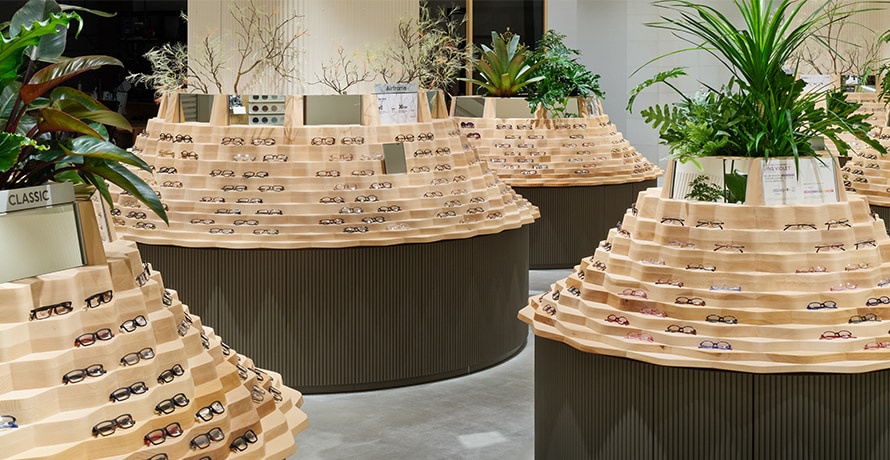
Certain JINS stores have reduced their carbon footprint while contributing to local communities by actively making use of domestic wood for in-store fixtures. Examples include JINS Namba Parks, which uses small diameter wood with few usage applications for its fixtures, and JINS Yume Town Saga, which uses cypress wood from Saga Prefecture.
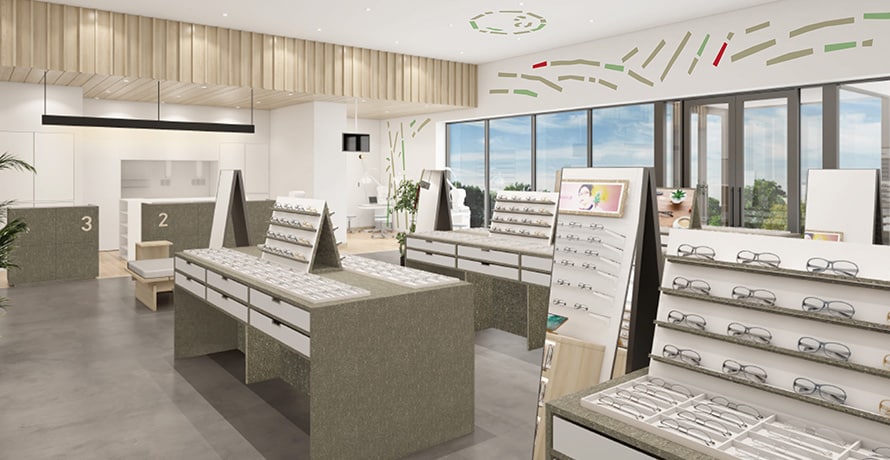
At JINS Fuji Iriyamase, PANECO®, a recyclable textile board, has been used for store fixtures. Wood from approximately 46 product shelves that were no longer used at JINS stores nationwide and planned for disposal, clothing and others were used as raw materials to be newly transformed into six product shelves and part of a customer service counter at JINS Fuji Iriyamase.
We are planning to be more proactive in our efforts to use environmentally friendly fixtures and building materials when constructing and opening new stores in the future.
Introducing Renewable Energy at Factories
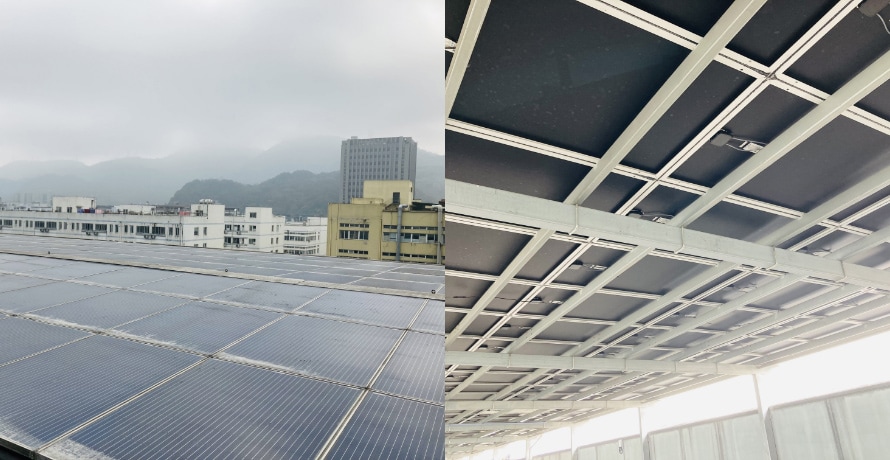
As a leading company in the eyewear industry, JINS is actively working on conserving energy in the production process. We are considering expanding the introduction of renewable energy at JINS-owned factories, including the installation of solar power generation equipment.
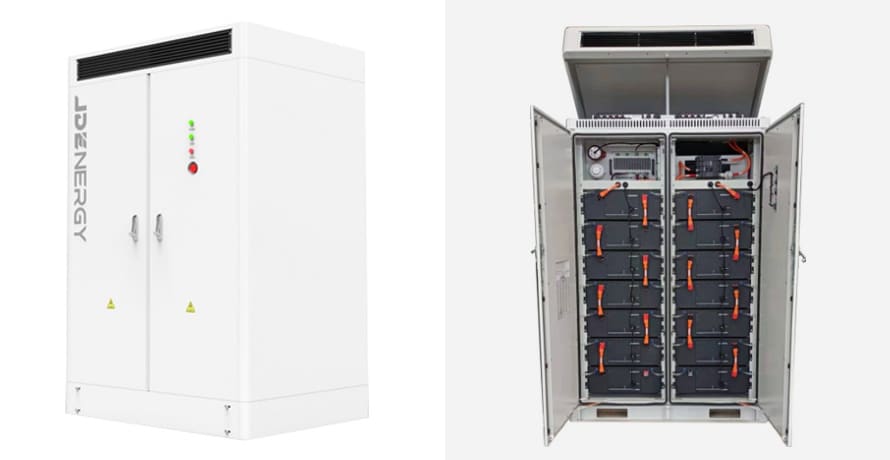
We are promoting the introduction of renewable energy by encouraging partner factories to join us in our efforts. In addition to solar power generation equipment, we are also working to make more efficient use of renewable energy through the use of storage batteries, thereby promoting environmentally friendly product production.
Understanding Environmental Data of Suppliers and Contractors and Reducing GHGs
As a way of reducing environmental impact throughout the entire supply chain, JINS is enhancing supply chain management. We request that eyewear frame and case factories in China, which are our major suppliers, conduct external audits that include environmental checks carried out by a third-party organization, and disclose energy usage and other environmental data on a monthly basis. We aim to promote and enhance consistent efforts throughout the supply chain with the hope that all our suppliers will share our vision.
Calculating Carbon Footprint of Leading Eyewear Products
JINS calculated the CO2 emissions of its leading eyewear products at each life cycle stage. As a result, we found that CO2 emissions were high during the production stage. With this in mind, recognizing the importance of reducing emissions during the production stage, we will work to reduce CO2 emissions at our production factories, including energy conservation and the use of renewable energy.

Reducing Fuel by Decentralizing Logistics Bases
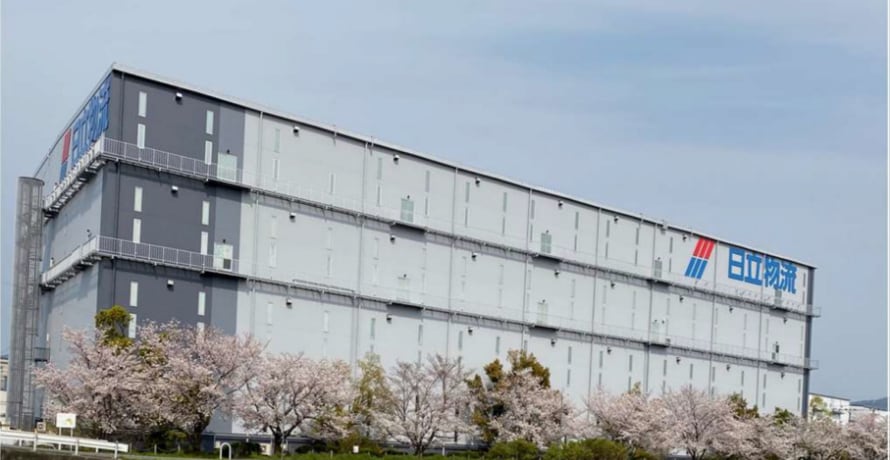
In September 2021, JINS launched operations at the Osaka Warehouse as a new logistics hub to support business expansion, enhance our Business Continuity Plan (BCP) measures, and reduce greenhouse gas emissions. By establishing logistics hubs in both the Kanto and Kansai regions, we not only strengthen risk management against natural disasters but also significantly reduce the distance and time required to deliver products from warehouses to stores.
Reducing C02 Emissions by Improving the Distribution System
In April 2022, JINS improved the product distribution system between its two logistics bases in Japan and JINS stores nationwide. The frequency and volume of product shipments were reviewed by store sales amount and optimized to reduce the overall number of shipments without causing product shortages at stores.
- Sustainability Home
-
JINS’ Ideal World
-
Material Issues and Medium to Long-Term Goals
-
Messages from Executives
- Sustainability Promotion System
-
Environment
-
Society
-
Contributing to Local Communities
-
Governance
- External Evaluation and Initiatives
